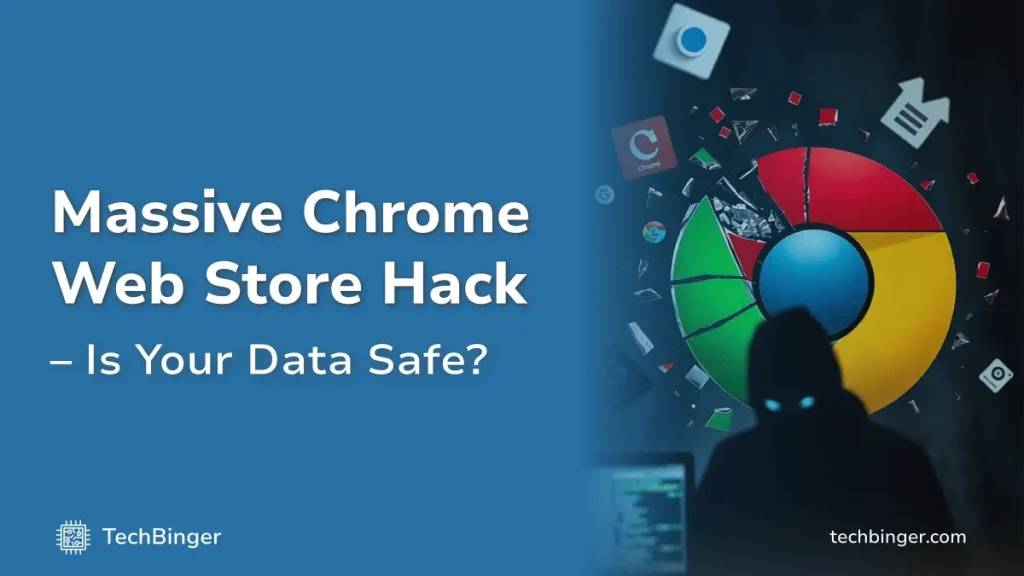A recent cyberattack on Chrome Web Store has put the personal information of over 600,000 users at risk. Hackers have managed to compromise several popular Google Chrome extensions, exposing user data, stealing credentials, and potentially bypassing security measures like two-factor authentication (2FA).

Topics We’ll Cover
How the Attack Unfolded
It all started with a clever phishing scam. On December 24, 2024, Cyberhaven, a cybersecurity firm, revealed that its Chrome extension had been affected by this attack. Hackers sent a fraudulent email pretending to be from Google Chrome’s official team. The email claimed Cyberhaven’s extension had violated store policies and would be removed unless the recipient clicked a link to accept updated terms.
Unfortunately, clicking that link granted the hackers access to the extension’s developer account. Once in, the hackers uploaded a fake, malicious version of the extension to the Chrome Web Store, where it stayed live for 24 hours. During this time, anyone who installed it had their sensitive data exposed.
Which Extensions Were Compromised?
A number of widely used extensions were affected. Some of the biggest names include AI Assistant-ChatGPT, VPNCity, VidHelper Video Downloader, and even some tools designed for business and social media management. The malicious code embedded in these extensions could steal things like login credentials and access tokens for social media accounts.
For example, in Cyberhaven’s case, the hackers specifically targeted users involved in Facebook Ads, stealing their account information and ad details. Even more concerning, the malicious code tried to bypass Facebook’s security system, including 2FA, by searching for QR codes on users’ pages.
If you want to learn more about securing your Gmail from similar attacks and avoiding common mistakes, check out Is Your Gmail Secure? This Common Mistake Could Let Strangers Access Your Inbox!
What Should You Do if You Were Affected?
If you’ve installed any of the compromised extensions, it’s important to act fast. Delete the extensions right away and reinstall the latest, secure versions. Running a full system scan with antivirus software can also help remove any lingering malware that might have slipped through.
In addition, as we’ve seen with other types of attacks, such as Gmail’s 2FA vulnerabilities, it’s important to strengthen all of your accounts’ security measures. For extra protection, consider creating a backup Gmail account and reviewing how to keep it secure. Learn more in our article Urgent Alert: Gmail’s 2FA Is Under Attack—Create a Backup Gmail Account for Security!
What Can Developers Do to Protect Their Extensions?
For developers who create browser extensions, this attack serves as a wake-up call. To better protect themselves and their users, developers should:
- Enable two-factor authentication (2FA) for their developer accounts to prevent unauthorized access.
- Request only necessary permissions: Extensions should ask for the minimum amount of access they need to function.
- Sanitize incoming data: Always check and clean data that comes from outside sources to protect the extension from malicious code.
Why Do Hackers Target Browser Extensions?
Browser extensions are often granted extensive access to personal data, such as login information and session cookies. This makes them an attractive target for cybercriminals. Unfortunately, many companies don’t monitor the extensions their employees are using, leaving them vulnerable to attacks like this.
Even though Chrome Web Store reviews extensions before they go live, this attack shows how sophisticated hackers can be at bypassing security measures. This breach is a reminder that developers and users alike need to stay alert when it comes to securing browser extensions.
Looking Ahead: How to Stay Safe
This incident is part of a growing trend where hackers target browser extensions to gain access to sensitive data. Experts at cybersecurity firms like SquareX are working on better tools to help monitor and protect against such attacks. However, the key takeaway here is that as more people rely on browser-based tools, the need for stronger security will only increase.
Whether you’re an individual user or a business, it’s important to be cautious when installing or updating browser extensions. Make sure you’re only using trusted, secure extensions, and always keep an eye out for any unusual activity.
Leave a Reply
You must be logged in to post a comment.